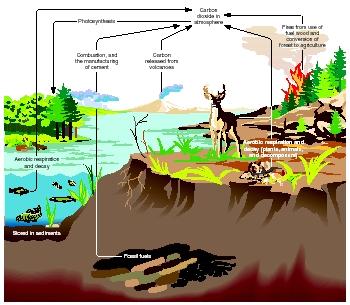|
This section contains 1,500 words (approx. 5 pages at 300 words per page) |

|
Carbon emissions trading (CET) is a practice allowing coun
tries—and corporations—to trade their harmful carbon emissions for credit to meet their designated carbon emission limits. Most developed countries approved this system in 1992 when the United Nations Framework Convention on Climate Change (UNFCCC) was presented. The document provided for limits on greenhouse gas emissions in an attempt to stem the determination of climate change around the world. The
United States as of 2001 had backed away from the Kyoto Treaty stating similar restriction but would remain obligated in some regard to the UNFCCC. At least in theory, CET allows one country who might not be maintaining their target to trade credits with others that are well under theirs.
 Carbon cycle. (Illustration by Hans & Cassidy.)
Carbon cycle. (Illustration by Hans & Cassidy.)
According to information from the Australian Academy of Science, in Nova: Science in the news, carbon dioxide (CO2) is known...
|
This section contains 1,500 words (approx. 5 pages at 300 words per page) |

|


